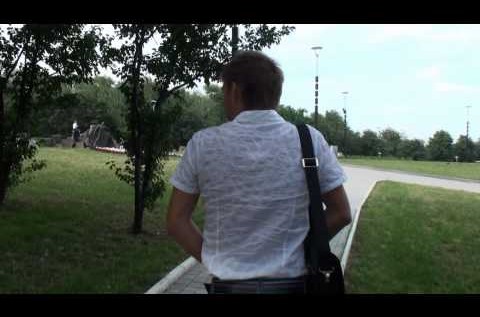An Unlikely Filmmaker Documents the Fight Against Drug Addiction in Ukraine (Video)

Methadone and buprenorphine can change lives.
Around the globe, that message is what we hear time and again: the gold standard in drug treatment, these medications guarantee a stability that allows drug users to reestablish family ties, hold down steady jobs, and look after their health. To start anew. And in Ukraine, for instance, this second chance costs as little as $7 per month for each patient.
Filmmaker Igor Kuzmenko, a recipient of Open Society Foundations support, has chronicled the life-changing transformation opioid substitution treatment (OST)—either buprenorphine or methadone—can provide patients in Ukraine, in a series of web videos called The Right to Be Dependent. In the latest film, above, Kuzmenko tells the story of Evgeniy Selin, a Russian citizen who on buprenorphine has built a thriving pharmacy business in Donetsk, Ukraine. “Substitution treatment is a way out of the dead-end that is drug addiction,” as Evgeniy puts it. “Now my life is just beginning.”
Below Igor explains why OST is essential, what is standing in the way of more people receiving it in Ukraine, and how he became an unlikely documentary filmmaker.
Tell us a little bit about yourself.
I work for an NGO in Simferopol, Ukraine, that provides psychosocial support and case management to OST patients. I myself have been an OST patient for four years, and I can honestly say that this is the first time in my life that I love my job.
Last year I had the opportunity to go to Budapest and participate in a 10-day training on video advocacy organized by the Open Society Foundations, the Hungarian Civil Liberties Union and WITNESS. In this very short period, we—10 newcomers to filmmaking from different countries—were taught how to film, edit, and be decent journalists. At the end of the training we were encouraged to film our debut works. As a result, my first movie was born, “The Right To Be Dependent: Sergey.”
Why film the life stories of OST patients?
It’s strange, but it helps that I am not a professional filmmaker: my interviewees, knowing that I am not a journalist are less restrained and more open. It’s very important that I am a patient, too—I am one of them! So it’s like a counseling session “peer-to-peer.” They are sure that I will not betray them in any way. And I have no interest in “hot” facts—I never leave something in a film that could compromise a patient.
When I make videos about OST patients, I want only one thing: that all Ukrainian drug users are, once and for all, treated and viewed as human beings. I want nothing else! I want for OST patients to stop being viewed as some sort of scarecrows in our society. Perhaps we don’t deserve the light, but at least we deserve to be left in peace.
Who is the audience for your films?
First and foremost, it is anyone who can make an impact: “To all who compose the laws, I dedicate my work.” I don’t want to talk about “target audiences” now, though this is the definition for any documentary or video filmmaker.
At the training on video advocacy we were taught: “Your viewer is a granny in front of a TV set.” That’s the most precise definition of my audiences. If the film is made in a simple language, and if in five minutes I can, well, maybe not convert but at least have an opponent of methadone programs start thinking about these programs in a more positive way—I am ecstatic. I always show the film to my mom first—she is that woman in front of the TV! And if she doesn’t get something, my work is not done.
Tell us about Zhenya Selin, the title character of your film featured above. Why were you interested in his story?
Zhenya is a guy with an intense life story. A Russian citizen living now in Donetsk, Ukraine, today Zhenya is a perfect example of a drug user who has, on OST, established himself in society. But his is also another classic tale: youth on drugs, going to prison for theft, coming to terms with yourself, starting OST. And he has a grand personality. He is not afraid of hardships, or, if he is, he is good at concealing his fears. He is a talented businessman, and the pharmacy business he runs— it’s only the beginning. Do you think that living his dream would be possible if not for OST? Of course not! And that’s the answer.
It’s symbolic that Zhenya is a citizen of Russia to this day. Zhenya went to another country only so he wouldn’t die. He doesn’t break the ties that connect him to his motherland, he doesn’t change his citizenship. It’s clear that Donetsk would not appear in his life, if substitution therapy was available in Russia. We can talk about economic development, accessibility of housing, oil, but if the country can’t offer you one simple thing—an opportunity to choose a better path—is everything really so great in that country? We all know the answer.
Your latest film is dedicated to achieving uninterrupted OST delivery in Ukraine. Why choose this issue to feature?
It’s a big problem—the interruption of substitution treatment. You couldn’t even imagine it happening with another medicine: what if a diabetic is in a hospital to get his appendicitis removed, woke up after surgery and needed an insulin shot, and the doctors told him: “We are sorry, buddy, but you have to wait five to seven days, you can’t do it here, this is the surgical ward. When you are feeling well and go home, you can do it there.” Ridiculous, right? But this is exactly the issue. Addiction is also a chronic and untreatable illness, and OST is an essential medicine.
The reality is that the linkages between medical institutions of different categories and designations in our country are so complicated—they could drive a sane man crazy. Prescriptions are an ideal solution to this problem. In Simferopol, we are trying to push for this solution by piloting a prescription-based project. We hope that we are successful, there is no other way.
What else is standing in the way of scaling up OST programs in Ukraine?
There are many pressing issues. To be exact, all issues that concern OST are pressing. For one, the legal status of OST in Ukraine is extremely problematic—the risks that the medical workers must take to distribute the medicine are unprecedented and unreasonable.
Opportunistic infections are of great concern. Among them, tuberculosis and hepatitis C are leading in our country. We are all used to the fact that everyone in their medical history has a stamp that says, “Has had recent contact with a TB-infected person.” That is very scary! I can’t talk about hepatitis C because it upsets me so much. It’s my impression that everyone in our country is just pretending that the huge issue of hepatitis just doesn’t exist.
But luckily, everything I listed here can be changed. All we need is for people to understand that the issues of one particular group are common issues. So they should be treated as everyone’s problems.
What are OST patients capable of changing on their own? How?
First of all, we need to start respecting ourselves. Could you imagine this situation: a cop comes up to a regular person on the street and starts pawing them, and searching them, and cussing at them and at that, maybe the cop even gives this person a punch to the liver. Everything is possible in our country, but this doesn’t happen very frequently. But with OST patients, it happens all the time! And people talk and write about it, but not in the popular press, on the margins. And so what we have is that we are not considered normal people, proper citizens and we don’t have any proof of these violations.
Patients don’t bring such cases to court. OK, it’s scary, and you can expect anything from police, but this shouldn’t be just about fear. It also should be about self-respect. We are active citizens of this country—we work, we pay taxes. But we still perceive ourselves like we did when we were using illegal drugs—with no respect.
So, in Ukraine, we have this wonderful organization, Association of Substitution Treatment Advocates of Ukraine. It unites not only patients, but also those individuals who understand the importance and necessity of OST for Ukraine. I really hope that the Association will make its own statement that will change the situation for the better. I think this statement will be one word: RESPECT. With that we can do anything!




![Anchorman 2 HD Teaser [Trailer]](http://iamnotarapperispit.com/wp-content/uploads/0454-480x317.jpg)
An Unlikely Filmmaker Documents the Fight Against Drug Addiction in Ukraine (Video) http://t.co/PI75zz0b
#IAmNotARapper: An Unlikely Filmmaker Documents the Fight Against Drug Addiction in Ukraine (Video) http://t.co/OVrwm7aJ